Thinking Like a Gig Worker:
A Vector Poll™ case study
By Marc Zwelling and Adrian Macaulay of The Vector Poll™
Why it matters to think like a gig worker.
Think of gig workers as a potentially large, untapped market.
- Seven in 10 gig workers believe they should be allowed to join unions.
- A large majority of Canadians and gig workers say online job platforms like Uber should provide gig workers with workplace benefits.
- A majority of union members throughout the country believe gig workers should be allowed to form unions.
- People who work gig jobs believe in the future most workers will be gig workers.
- A union, for example, could package information, experience and know-how that the union has already into a benefit for gig workers (newsletters, an "ask a union expert" live chat, a helpdesk for temps, a safety and health hotline).
- A union could have a website where gig workers confidentially can reach an organizer, talk with members who feel engaged in the union, and sign a membership card with an electronic signature.
How to reach gig workers with your message
Do not call them "gig workers." Most Canadians don't know what the terms gig work or the gig economy refer to. Instead say, "If you do temporary or short-term projects and jobs you don't expect to last…."
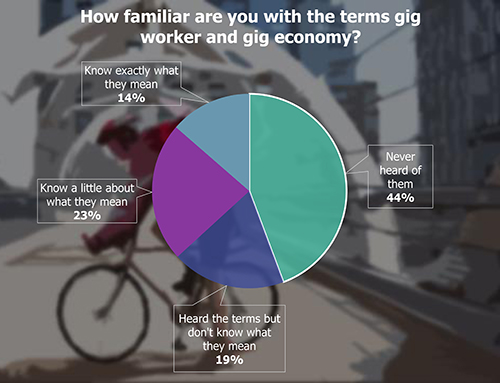
Profile of a Gig Worker
One in four Canadians have worked in the gig economy in the past year.
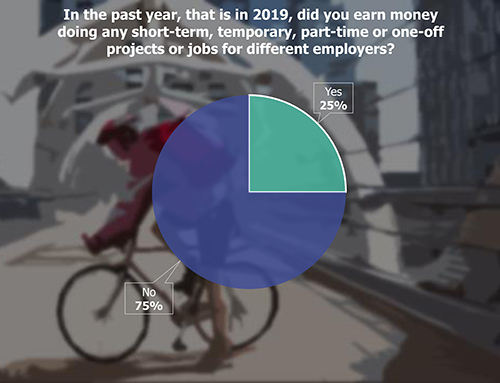
Gig workers are more likely to be:
- Under the age of 35
- Students or in training programs
- Working part-time
- Self-employed
Are Gig Workers Employees or Independent Contractors?
Canadians have the wrong image of gig workers and think they have clients, not bosses.
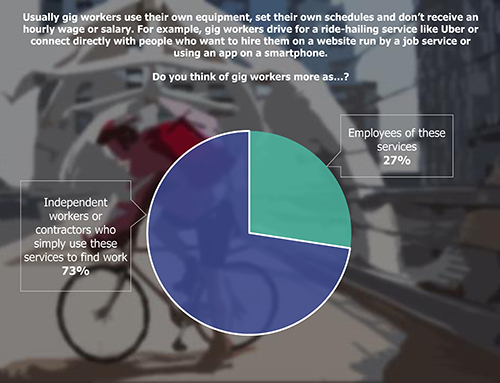
Although most gig workers see themselves as independent contractors, almost half see themselves as employees. That's why so many gig employees want unions.
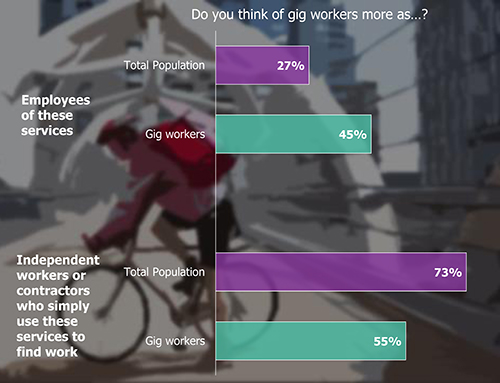
Gig Workers Unite?
Organizing gig workers is easier with public support. A majority of Canadians believe gig workers should be allowed to form unions.
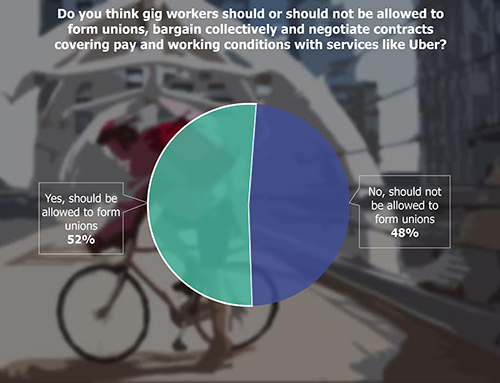
Gig workers are more likely than other people to believe gig workers should be allowed to unionize. Nearly 4 in 10 gig workers say they would vote for a union in a labour-board-supervised secret ballot (The Vector Poll™, 2017).
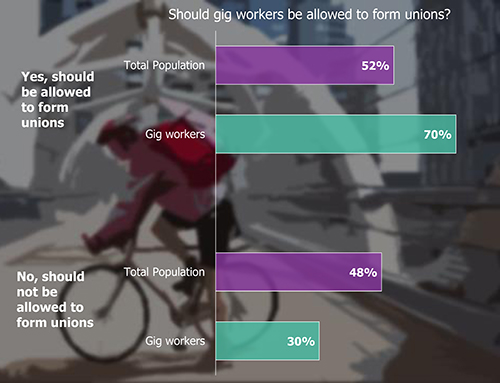
Gig Workers and Benefits
The public sympathizes with gig workers against gig employers. A majority of Canadians believe companies running job platforms should provide benefits to gig workers.
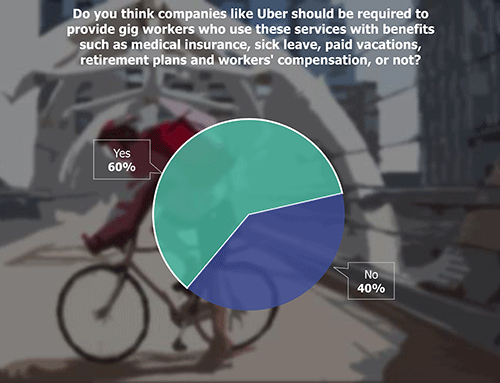
No matter how they think of themselves — employees or independent workers — gig workers say job platforms should provide benefits for gig workers.
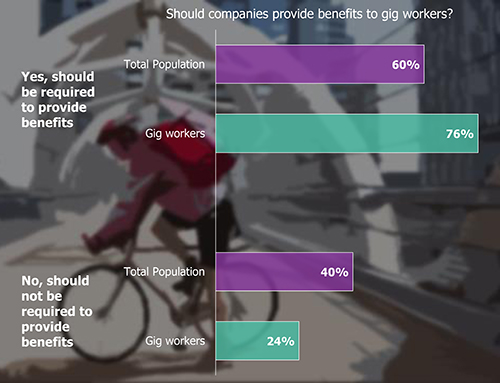
Future of the Gig Economy
Canadians think gig work is going to be a big part of the economy of the future.
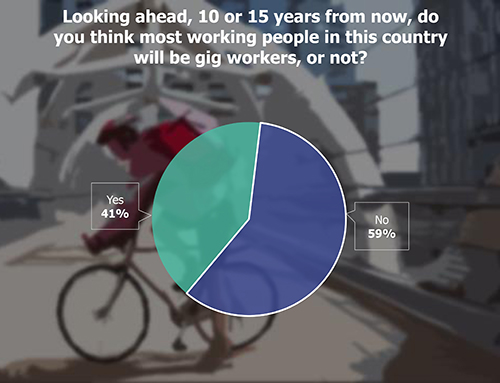
Unions will be seen as doing the right thing by organizing gig workers because young Canadians and union members are more likely to expect gig work will be significant in the economy of the future.
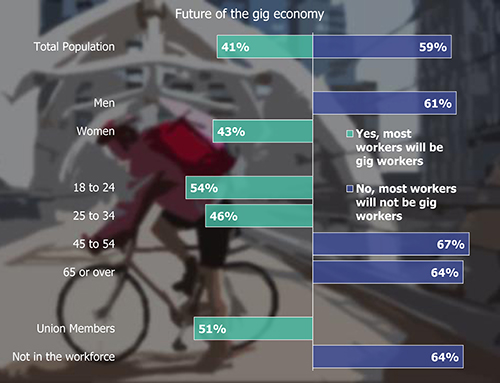
Most people doing gig work today believe the future of work will revolve around the gig economy.
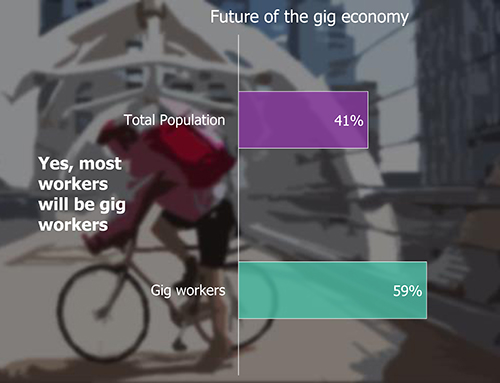
Methodology
- Online survey from a demographically representative panel of Canadians.
- N=1,100 adults (aged 18 and older) throughout the country.
- Survey conducted in English and French.
- Vector Research weighted the data in each region of the country to match the known demographic profile of the population in the census.
- Fieldwork April 17 through 25, 2020.
- With a pure probability sample of 1,100 one could say with 95% confidence that the overall results have a sampling error of plus or minus 2.9 percentage points where opinion is evenly divided.
The insights in this report are from the ongoing research conducted by The Vector Poll™ for the Union Opinion Project.
In Their Own Words: Leaders of the Union Opinion Project Say...
"The United Steelworkers is proud to be a long- standing participant in the Union Opinion Project. We're able to field custom polling questions on timely topics relevant to our union's specific issues. Marc and his team distill the results into valuable insights that inform our union staff and leadership. With the project's years of field research, we have access to an impressive back catalogue of results to give added context to the questions of today."
Kim Hume
Representative, Communications and Political Action
United Steelworkers National Office
Bob Gallagher
Department Head, Communications and Political Action
United Steelworkers National Office
"The Union Opinion Project helps OSSTF/FEESO communicate with policy makers, the public and our members with greater confidence and clarity. With the project's union-focused insights and ideas, we see new opportunities to improve public education and engage our members in the union."
Gary Fenn
Director, Communications/Political Action
Ontario Secondary School Teachers' Federation
"ETFO's participation in the Union Opinion Project has provided us with a valuable opportunity to work with other unions while conducting public opinion research.
Working with unions from various sectors provides us with additional perspectives and allows a healthy exchange of strategies and best practices. This collaboration has helped ETFO increase the effectiveness of our campaigns."
Federico Carvajal
Executive Assistant, Communications and Political Action
Elementary Teachers' Federation of Ontario
James Taylor
Executive Assistant, Communications and Political Action
Elementary Teachers' Federation of Ontario
"Vector polls alert ONA when voters change their views on health-care issues. ONA relies on the project's evidence-backed advice in advertising, government relations and organizing.
Working with different unions and getting different perspectives creates innovative, better ideas."
Lawrence Walter
Manager, Government Relations
Ontario Nurses' Assocation
Marc Zwelling is the founder of the Vector Poll™ and author of Public Opinion and Polling For Dummies (Wiley, 2012).
Adrian Macaulay is an opinion pollster for clients across the political spectrum and is a consultant in the wargaming approach to public affairs research and analysis.
< go back
Read more from The Vector Blog»

|